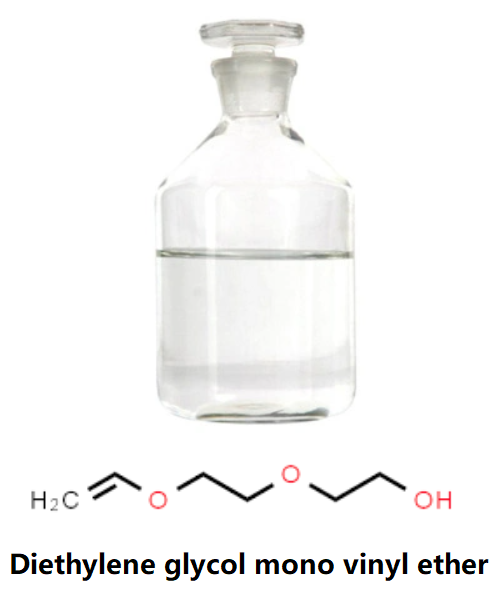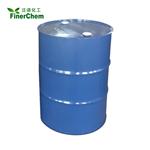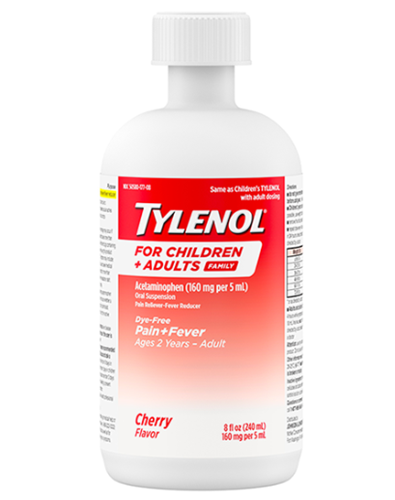Polymerization and application of Di(ethylene glycol) vinyl ether
Di(ethylene glycol) vinyl ether (diethylene glycol mono vinyl ether; DEGMVE) has good water solubility because of a hydroxyl group in the molecular structure and can be homopolymerized into a hydroxyl group-containing polymer by cationic polymerization or radical polymerization. The polymer can be dissolved or swelled in water to form a solution or a dispersion, has good properties such as stability and water retention, and has wide applications in fields such as biomedicine and surface protection materials. In addition, DEGMVE can be used as a comonomer to modify polymer properties such as high tensile strength, high anti-contamination properties, or environmentally sensitive properties.

The homopolymer of DEGMVE can be prepared by cationic polymerization. Since C=C of diethylene glycol vinyl ether will form p–π conjugate with oxygen having orphan electrons in the ortho position, the C=C forms an electron-rich structure, leading to a stable carbocation and cationic polymerization. The cationic polymerization of DEGMVE tends to form a liquid oligomer, mainly because the cationic polymerization occurs while the hydroxyl group on the DEGMVE reacts with the vinyl's carbon–carbon double bond to form an acetal. Nowak makes the hydroxyl group unaffected during the polymerization by continuously adding a peroxide initiator. In addition, the homopolymer can also be synthesized by a radiation polymerization technique, that is, a polymerization reaction occurs when a gamma ray of 60Co is used as a radiation source to irradiate the monomer to generate ions or radicals to form an active center, and the hydroxyl group remains in the reaction process.
DEGMVE can be used for the preparation of an anti-protein adsorption material through plasma polymerization, and the resulting nanoscale functional coating has the characteristics of high controllability, good stability, and excellent physical properties. DEGMVE is placed in a plasma reactor, and plasma is formed by gas molecules under the action of an electric field to cause polymerization, thereby attaching an anti-protein adsorption layer to the substrate. Proteins are amphiphilic macromolecules, which are easily absorbed and contaminate materials. The hydration of DEGMVE forms a tight water film around the poly(diethylene glycol mono vinyl ether) chain and results in a large hydration repulsive force, preventing the adsorption of proteins on the surface, which is known as the “water barrier effect.” Due to the critical application value of anti-protein adsorption materials in biomedical materials, surface protective coatings, and other fields, they have gradually become the research hotspot.
DEGMVE is copolymerized with N-vinylpyrrolidone to form a chemically stable rubber-like polymer by emulsion polymerization, which has very strong tensile strength under the action of a vulcanizing agent. In addition, DEGMVE reacts with alkyl bromide to synthesize a new monomer by cationic polymerization to prepare a comb-like polymer. Due to the specificity of the side chain, the material has a special phase transition behavior, and the heat storage value of the material reaches 180 J g–1, which can be used as an excellent phase change material. DEGMVE can also be used as a deactivator in the olefin metathesis reaction. The olefin metathesis reaction has been widely used in recent years. The new ruthenium carbene catalyst enhances the stability and reactivity of the reaction but also causes some side reactions. DEGMVE, as a deactivator for the olefin metathesis reaction, allows the ruthenium carbene catalyst to be rapidly deactivated at room temperature within 10 min.
See also
Lastest Price from Di(ethylene glycol) vinyl ether manufacturers

US $2.00/kg2025-04-21
- CAS:
- 929-37-3
- Min. Order:
- 1kg
- Purity:
- 99%
- Supply Ability:
- 2000MT

US $0.00-0.00/KG2025-04-15
- CAS:
- 929-37-3
- Min. Order:
- 1KG
- Purity:
- 99%
- Supply Ability:
- 500000kg


